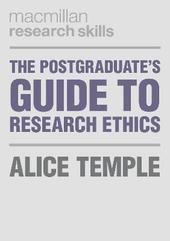
|
The Postgraduate's Guide to Research Ethics
Paperback / softback
Main Details
| Title |
The Postgraduate's Guide to Research Ethics
|
| Authors and Contributors |
By (author) Alice Temple
|
| Series | Bloomsbury Research Skills |
|---|
| Physical Properties |
| Format:Paperback / softback | | Pages:203 | | Dimensions(mm): Height 210,Width 148 |
|
| ISBN/Barcode |
9781137595171
|
| Classifications | Dewey:174.90014 |
|---|
| Audience | | Tertiary Education (US: College) | |
|---|
|
Publishing Details |
| Publisher |
Bloomsbury Publishing PLC
|
| Imprint |
Red Globe Press
|
| Publication Date |
19 September 2019 |
| Publication Country |
United Kingdom
|
Description
Drawing together the philosophical principles of research and the application of ethical theories to real-life case studies, this text provides a complete start-to-finish guide to research ethics for postgraduate researchers of all subject areas. It begins with a brief survey of ethical theories, before showing readers how to construct an ethics proposal. It then goes on to examine ethical issues as they relate to various methodologies, including interviews, participant observation, focus groups and questionnaires. Key themes such as online research, privacy and confidentiality and the involvement of children and vulnerable populations in research are also covered. The book concludes with a chapter addressing ethical issues which may arise once the research has been completed. Chapters are enriched and enlivened with case studies, 'ethical perspectives' boxes and 'ask yourself' questions for readers to consider. This text will be an invaluable source of guidance on the ethics application process and ethical issues in research for all postgraduate researchers.
Author Biography
Alice Temple is Head of Records Management and Information Governance at the University of Leeds, UK.
ReviewsAlice Temple's new book makes a valuable contribution for the teaching of research ethics by exploring different aspects of research practice through the lens of ethics theory. It will enable students to think more rigorously about moral challenges in their research and provide a helpful resource for creating research ethics teaching or training materials. * Andrew Rawnsley, Teesside University, UK *
|